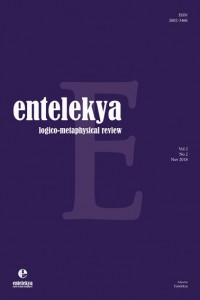Abstract
References
- Akkanat, Hasan. Klasik Dönem İslam Felsefesinde Tümeller. Adana: Ka-rahan Yayınevi, 2016.
- Al-Ghazālī, al-Ghazālī’s Moderation in Belief. Trans. Aladdin M. Yaqub. Chicago: The University of Chicago Press, 2013.
- Al-Ghazālī, The Incoherence of the Philosophers. A Parallel English-Arabic Text. Trans. Michael E. Marmura. Utah: Brigham Young University Press, 2000).
- Aristotle. De Interpretatione. Trans. E. M. Edghill. The Works of Aristotle, vol. I. Ed. W. David Ross. Oxford: Clarendon Press, 1926.
- Aristotle. Metaphysica. Trans. W. David Ross. The Works of Aristotle, vol. VIII. Ed. W. David Ross. Oxford: Clarendon Press, 1926.
- Fischer, John Martin & Kane, Robert. Four Views on Free Will. Oxford: Blackwell Publishing, 2007.
- Şimşek, İsmail. Düşünce Tarihinde Tanrı’nın Özgürlüğü Sorunu. Ankara: Elis Yayınları, 2017.
- Terkan, Fehrullah. “el-Ğazâlî’nin İlahi İradeye Dair Argümanları ve Müslüman Filozofların İtirazlarına Verdiği Cevaplar”. 900. Vefât Yılında İmâm Gazâlî. İstanbul: Marmara Üniversitesi İlahiyat Fakültesi Vakfı Yayınları, 2012, 615-39.
The Relationship between God's Knowledge and Will in the al-Ghazālian Theology: A Critical Approach
Abstract
The Ghazālian theory of the divine will with ‘optional choice’ does not function without the word “in the past-eternity.” What is problematic here is that you attempt to design the divine attributes and actions according to two-valued logic: God first must know something and then wills it. The fact that God first knows something, and later prefers it among the others in His knowledge, then begins to create it, shows that divine activities occur in a fictional sequence designed by two-valued logic which enables Him not to be in two different states in one moment, or to do three actions in a moment, or to engage in four different jobs at the same time. Avicenna attributes the will to knowledge because he realizes the relational problems between these two attributes, but his approach arises from some other problems. Then, which solution can be proposed for the issue by al-Ghazālī, who claims that knowledge and the will are the mutually compatible and complementary attributes for God’s relationship to the universe? My article discusses whether al-Ghazālī supports his claim with adequate arguments or not.
References
- Akkanat, Hasan. Klasik Dönem İslam Felsefesinde Tümeller. Adana: Ka-rahan Yayınevi, 2016.
- Al-Ghazālī, al-Ghazālī’s Moderation in Belief. Trans. Aladdin M. Yaqub. Chicago: The University of Chicago Press, 2013.
- Al-Ghazālī, The Incoherence of the Philosophers. A Parallel English-Arabic Text. Trans. Michael E. Marmura. Utah: Brigham Young University Press, 2000).
- Aristotle. De Interpretatione. Trans. E. M. Edghill. The Works of Aristotle, vol. I. Ed. W. David Ross. Oxford: Clarendon Press, 1926.
- Aristotle. Metaphysica. Trans. W. David Ross. The Works of Aristotle, vol. VIII. Ed. W. David Ross. Oxford: Clarendon Press, 1926.
- Fischer, John Martin & Kane, Robert. Four Views on Free Will. Oxford: Blackwell Publishing, 2007.
- Şimşek, İsmail. Düşünce Tarihinde Tanrı’nın Özgürlüğü Sorunu. Ankara: Elis Yayınları, 2017.
- Terkan, Fehrullah. “el-Ğazâlî’nin İlahi İradeye Dair Argümanları ve Müslüman Filozofların İtirazlarına Verdiği Cevaplar”. 900. Vefât Yılında İmâm Gazâlî. İstanbul: Marmara Üniversitesi İlahiyat Fakültesi Vakfı Yayınları, 2012, 615-39.
Details
| Primary Language | English |
|---|---|
| Journal Section | Article |
| Authors | |
| Publication Date | December 20, 2018 |
| Published in Issue | Year 2018 Volume: 2 Issue: 2 |

